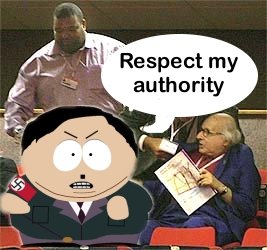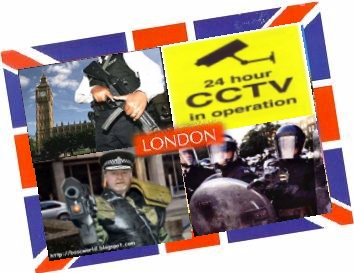I've been watching Andrew Marr's new programme. I found it quite enjoyable to discover that without the constraints of news reporting he's able to conclusively prove that he's just as eccentric as we've always suspected. Hurray for quirkiness, that's what I say.
In today's broadcast he interviewed the big man himself. It'll be available on the
BBC website for a week if you missed it. I seem to remember reading somewhere that Marr is a rabid New Labour supporter. The evidence of this interview would appear to suggest otherwise. As usual, it's the PMs comments on Iraq which I find most worthy of note. Here's my analysis of the highlights of the interview. (This section of the interview start 44 mins into the programme. Quotations may be paraphrased slightly because I'm hopeless at taking notes.)
Marr begins by nailing down his right to ask questions about Iraq. He suggests that he's heard rumours that Blair doesn't want Iraq to be a topic of discussion at the Labour Party conference.
A.M. I can't believe you don't want it discussed because it is such an important issue.
T.B. No, and of course it will be discussed.
It's obvious to all and sundry that Blair would rather it wasn't discussed. Direct hit by Andrew there and Blair is now unable to avoid answering questions on the subject.
Marr suggests that Iraq as a country is threatening to fall apart, citing the recent warnings of the Saudi government.
A.M. There are fears of a Shia state in the south, part of an Iranian dominated Shia area. It's not the unified peaceful democratic Iraq that you hoped for, is it?
T.B. But that's what we're trying to get to. Why do you think the terrorits and insurgents are doing what they are doing at the moment? Because they know that in December there is going to be the first democratic election to elect a government in Iraq and they are desperate to stop it. Why do they want to stop it? Because ordinary Iraqi's want democracy.
Blair has not answered the question. No-one disputes that that is what he's trying to get to. The problem is that it isn't what we're actually getting. Does he have any opinion on what we should do to try to avoid the breakup from occurring? It's impossible to tell.
Instead, we get treated to another round of the type of painfully naive and simplistic thinking which got us into this mess in the first place. The reasons for the insurgency are complex and varied. The idea that it is fuelled simply by an irrational hatred of democracy is, I'm afraid, childishly silly. That isn't to say that some of the participants don't have an irrational hatred of democracy, mind you, but there is far more to it than that. Also, a
recent report has concluded that more than 90% of insurgents are Iraqis. It seems that not all "ordinary Iraqis" want what Blair thinks they want.
Btw, it's interesting to note that Blair assumes that the elections in December will be for the new government. He doesn't appear to have any concerns about the constitution referendum in October. As I understand it the constitution is still fairly controversial so Blair's confidence seems a little odd. Perhaps it's just an oversight on his part.
Marr then brings up the subject of the inflitration of the Iraqi security services by insurgent groups.
A.M. Do you have any idea how many of those people are on the other side?
T.B. No, it is incredibly difficult...
WTF? I'm sure I don't need to emphasise how much of a problem this could be for our exit strategy. I've read reports that more than 25% of the security services are sympathetic to one insurgent group or another. How many insurgents are we actually training? Blair doesn't know and doesn't appear to show any great inclination to find out either. Does the government have any plans for dealing with this? Who knows. Instead, he launches into a now familiar rant about how the UN mandate provides moral authority for our actions in Iraq. This is misleading nonsense, as I mentioned in a
previous post.
Marr then asks about that elusive exit strategy.
T.B. As the Iraqi forces build up, we will reduce our troop levels. There will be no timescale. The strategy is as it has always been.
A.M. Critics would say, we understand that but it is not working.
T.B. Well, lets wait for the elections in December. We are rebuilding the country and it is very difficult...
The key here is "The exit strategy is as it has always been". Yes, that's true and that's the problem. Wait for elections in December? It's got a familiar ring to it. Wait for the handover of sovereignty, wait for these elections, wait for the killing of Saddam loyalists, wait for the capture of Saddam, wait for, wait for, wait for... We've waited more than two years. More importantly, the people of Iraq have waited more than two years. Can anyone seriously argue that the security situation has improved in any way whatsover in those two years of waiting? Are our troops even one step closer to coming home? The exit strategy is as it has always been.
Marr then goes on to ask if the PM had expected the amount of resistance to be as great as it has. Blair says he did not anticipate the extent of the resistance. At the risk of crowing, I did, and I don't have highly paid advisors to help out. This misjudgement is inexcusable in my opinion. Marr asks if he would have taken the same descision if he had understood how difficult it was going to be. Blair launches another salvo of spurious rhetoric in response.
T.B. There is no doubt in my mind at all that what is happening in Iraq now is crucial for the future of our own security... It is crucial for the security of the world.
For a change, I actually agree. If Iraq falls apart it could cause serious instability in the region. All sorts of nasty consequences could follow. What Blair doesn't mention is that this is a problem entirely of his own making (along with Dubya obviously). It is now abundantly clear that Iraq was not a threat to our national security before the invasion. Now, because of the military intervention, it might well become just that. And Iran is probably exploiting the situation to continue to develop their nuclear programme (another emminently predictable consequence of the invasion I might add). That's exactly why we need a major rethink of what we can realistically achieve in Iraq and how we can best achieve it.
Blair then utters a sentence which is stomach churningly worrying even by his standards.
If they are defeated, this type of global terrorism and insurgency in Iraq, we will defeat them everywhere.
I genuinely do get a hollow feeling in my stomach every time I think about this sentence. What on earth does he mean? What possible reasons could he have for drawing such a conclusion? Are we to use the operation in Iraq as a template in dealing with all terrorists and insurgents? Three of the London bombers were from Leeds. Are we going to invade? Should citizens of Leeds be considering evacuating the city? OK, I don't actually think that's what he means but what does he mean? In the same way that Blair likes to point out that 9/11 happened before the invasion of Iraq, I'd like to do the same. Some extremists existed before Iraq (now there are almost certainly many many more of course), and some will remain no matter what happens in Iraq. The extremists aren't going to go "oh look, Iraq has become a stable democracy (in itself hardly likely at present), that's us lost then, we'd better start handing ourselves in". Blair doesn't appear to understand this. He is, to quote Homer "living in a world of make believe".*
At one time I thought Blair's simplistic attitudes with respect to the "war" on terror were a front, a fiction created purely for public consumption. I found the idea that our PM would manipulate public opinion in this way pretty frightening. These days I'm beginning to think that the problem is much worse than that. I think our PM might suffer from a syndrome which leads to the development of unshakable convictions based on a childlike simplicity of thought. It's a horrifying thought but I'm beginning to think he may be in some way related to
this man.
*Simpson.






